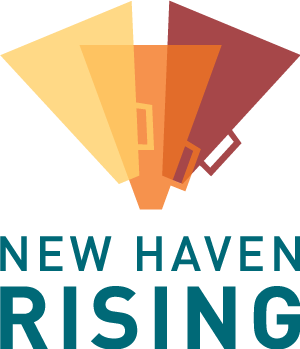Our Fight
Locked Out of Opportunity
The greater New Haven region has experienced a model of segregated development for over eighty years. New Haven Rising is committed to undoing this model by advocating for progress that offers dignity and freedom to all of our region’s residents.
In the late 1930s and early 1940s the Home Owners Loan Corporation codified racial and economic segregation across the United States with redlining maps. Entire neighborhoods were coded as Hazardous and Declining, which prevented residents in these neighborhoods from accessing finance that would allow them to buy and invest in houses, thereby building inter-generational wealth. Throughout the rest of the 20th century many white residents who held good jobs fled to the suburbs with their jobs.
Redlining has since been outlawed with the passage of the Fair Housing act in 1968 but the effects are still visible. Even though New Haven has experienced it’s most recent renaissance, low-income neighborhoods where many black and brown residents reside have been locked out of much of the opportunity that has come with this development. Incredibly, there is a strong correlation between the neighborhoods that were redlined in 1937 and the neighborhoods that experienced the highest rates of unemployment after the 2008 financial crisis. We are working to build a new model of development that includes opportunities for everyone.
Use the slider in the middle and move it left to right to see the correlation between redlining in the late 30’s and unemployment in 2010.
We’ve Been Winning
Since our inception in 2011, New Haven Rising has worked to create economic, social and racial justice. Our members across New Haven have pushed those in power to create a more equitable city with opportunities for all. We are proud of our successes: a community benefits agreement with charter schools, the election of politicians who are responsive to the people rather than to special interests, and an agreement with large institutions to hire locally.
The Jobs Agreement
16 Pathways to a Job at Yale
It took 1155 days, dozens of rallies, hundreds of volunteers, and thousands of citizens coming together to demand one thing: that Yale respect New Haven. As a result of this campaign, Yale University committed to hiring 1000 people from New Haven, 500 from neighborhoods with the highest unemployment. As the initial deadline for this agreement approached, the Board of Alders held a public hearing for University officials to update the public about their progress. Almost 500 people packed the room to hear Janet Linder, Yale University Vice President of Human Resources admit that those at the University “[did] not consider our work done.”
Six months after the Board of Alders meeting, the people in this city could celebrate another major victory. In August, the University came to an agreement with leaders of UNITE HERE Local 34 & Local 35, and New Haven Rising to not only close the gap that was left behind but also expand on that work. At a celebration held at First and Summerfield Church, supporters cheered for their victory. Former Mayor Toni Harp, State Senator Martin Looney, and other leaders of the movement came together and spoke about 16 job training, apprenticeship, and hiring programs targeted towards New Haven’s residents.
The new deal includes an additional 300 jobs for the neighborhoods that have been systematically locked out of opportunity. Additionally, there will be a slew of programs and initiatives to prepare and give residents of New Haven good jobs in perpetuity.
Some of these programs include
New license trade apprenticeship programs for those interested in becoming plumbers, electricians, glaziers and HVAC maintenance workers.
Yale will pay $4,000 in tuition costs per student per year for New Haven Works members from neighborhoods of need interested in earning a degree from Gateway in a field relevant to a Local 34 clerical and technical workers job. Yale will also provide a $1,000 annual stipend per pupil for students in that program, and will hire 75 percent of graduates from that Yale-Local 34-New Haven Works-Gateway collaboration.
Financial incentives for Yale departments that hire residents from New Haven’s low-Income neighborhoods
For hundreds of families in this city this victory will mean more than just a higher standard of living. Many parents will have the chance to read to their kids at night because they do not need to work multiple jobs to keep the lights. Families can start saving for a dream house and use the assistance of the Yale Home buyers Program instead of renting.
But most of all it means economic freedom as with the case of Elidia Lezama. At the celebration, Elidia told her story of working part time jobs and at times coming home with just $25 in a pay period while supporting two kids. She now has a full time job at the University because of the work of volunteers, concerned citizens, political leaders, and organizers all pushing for a better New Haven.

